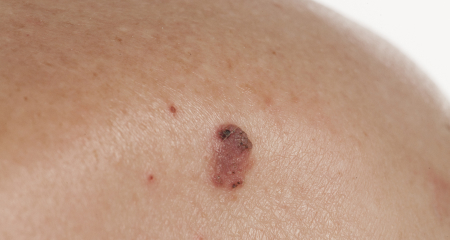
Melanoma arises from mutations in the skin’s melanocytes, which are the cells responsible for producing pigment. While anyone can develop melanoma, regardless of skin type, certain factors may elevate the risk of this skin cancer variety.
The likelihood of developing melanoma can increase due to the following:
• A history of extended sun exposure or indoor tanning
• A history of blistering sunburns
• Possessing fair skin, light-colored eyes, or naturally red or blonde hair
• Having a significant number of moles
• A family history of melanoma
While melanoma is the most deadly form of skin cancer, it’s also quite treatable if detected early. Routine skin examinations by a board-certified dermatologist can assist in identifying the symptoms of melanoma. Additionally, you can regularly check yourself to monitor for potential warning signs.
Remember this list of factors when examining your moles:
• Asymmetry: one half does not resemble the other
• Border: edges of the mole are blurred, uneven, or scalloped
• Color: the mole contains multiple shades or hues
• Diameter: noticeable increase in the mole’s size
• Evolution: the spot appears different from others or is fluctuating in size, shape, or color
If a spot on your body displays any of these characteristics, arrange for a skin cancer screening at Northstar Dermatology.
The clinicians at Northstar Dermatology specialize in the surgical treatment of melanoma. The primary approach is surgical excision. During this process, your dermatologist will remove the cancerous tissue along with a surrounding border of healthy tissue to ensure complete removal. After the area is closed up with sutures, some downtime will be necessary, as well as restrictions on lifting and physical activities for a few weeks.
Additional treatment options may involve being referred to a Mohs surgeon. If the melanoma has reached a particular stage, your dermatologist may also recommend a referral to an oncologist.
Upon receiving a melanoma diagnosis, it is crucial to follow up with your dermatologist for treatment as soon as possible. Melanoma can rapidly progress and become life-threatening. Get in touch with a board-certified dermatologist to discuss the optimal treatment plan for your situation.
